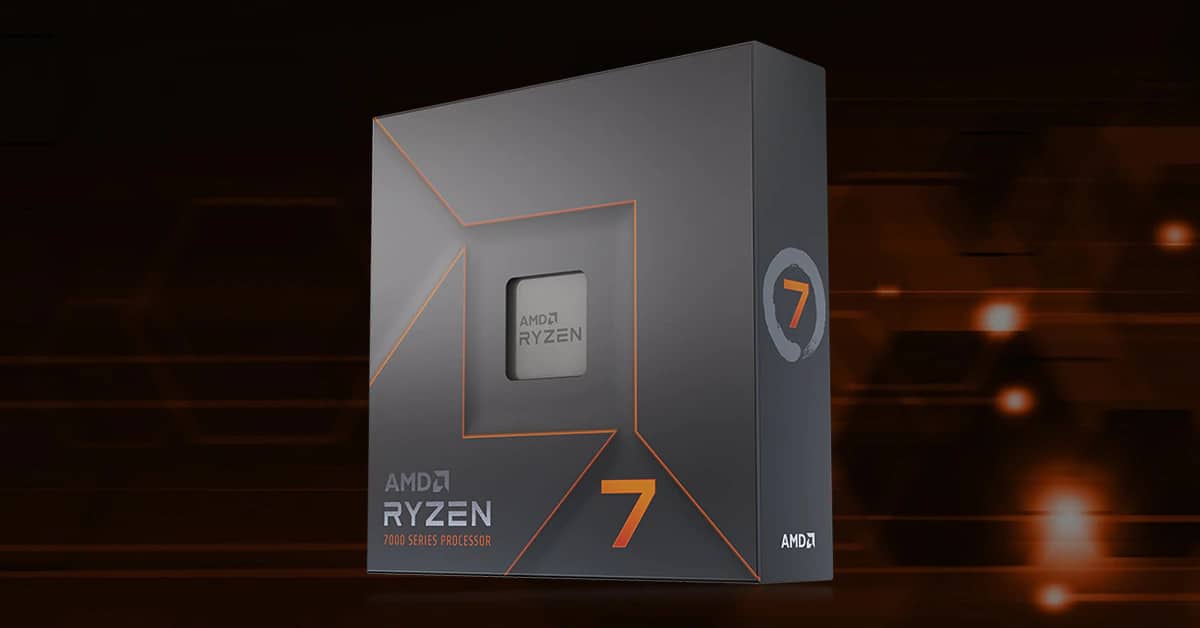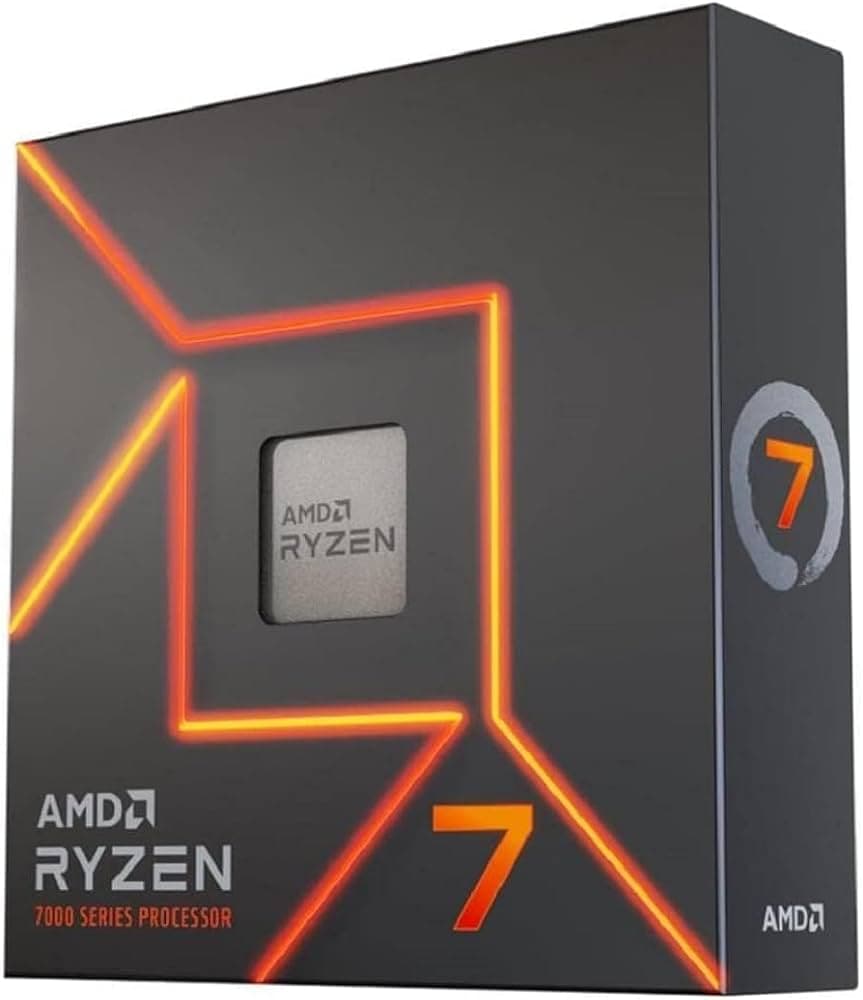Ryzen 7 7700 vs Ryzen 7 7700X

Table of Contents
Which CPU is better in the bout that sees the Ryzen 7 7700 vs the Ryzen 7 7700X? In this article, we will make a comparison of the specs, price tags, and overall performance of both AMD CPUs.
At CES 2023, AMD revealed the non-X series of its Zen 4 CPUs. With these new SKUs, it intends to show what it meant with performance-per-watt all the way back in 2022. The new CPUs are built to offer almost the same specs and results under a lower TDP.
Ryzen 7 7700

Cores
8
Threads
16
Boost speed
3.4 GHz
Base speed
4.6 GHz
L3 cache
32 MB
TDP
65W
Shop on Amazon
CHECK PRICEAMD Ryzen 7 7700X

Cores
8
Threads
16
Boost clock speed
5.4 GHz
Base clock speed
4.5 GHz
L3 Cache
32 MB
TDP
105W
Platform
AMD Socket AM5
Shop on Amazon
CHECK PRICERyzen 7 7700 vs Ryzen 7 7700X: Specs
Back in 2022, AMD emphasized the importance of efficiency. For Team Red, keeping a low TDP while delivering a strong and fast performance was the objective of its CPUs. The firm talked about performance-per-watt and we all expected to see really efficient CPUs. However, the 7000-series was not the most efficient of them all.
The Ryzen 7 7700X has a TDP of 105W, which is a number that lands just above the average when compared to Intel CPUs. AMD, then motivated by efficiency, revealed the non-X series of chips, CPUs that can achieve almost the same speeds and power as the X model but under an incredibly low TDP.
| Ryzen 7 7700 | Ryzen 7 7700X | |
| Architecture | Zen 4 | Zen 4 |
| Cores / Threads | 8 / 16 | 8 / 16 |
| Base clock speed | 3.8GHz | 4.5GHz |
| Boost clock speed | 5.3GHz | 5.4GHz |
| Cache L3 | 32MB | 32MB |
| TDP | 65W | 105W |
With that being said, the Ryzen 7 7700 and 7700X are both 8-core/16-thread processors based on the Zen 4 architecture. The main difference between the two is their clock speeds. The 7700 has a base clock speed of 3.8GHz and a boost clock speed of 5.3GHz, while the 7700X has a higher base clock speed of 4.5GHz and a slightly higher boost clock speed of 5.4GHz. Both processors have 32MB of L3 cache and the 7700X has a TDP of 105W, which is 40W higher than the 7700.
Reducing power consumption is a big plus to a CPU; however, there are sacrifices that have to be assumed by the user. A lower power need means having lower frequencies; the CPU can't run as fast as it would with a higher TDP, and that's why we see the drop in clock speed. The 7700X has a boosted clock speed of 5.4 GHz, while the non-X can only get to 5.3 GHz. And in the CPU field, a 0.1 GHz of difference is a lot; this will mark the overall performance of the unit. Although according to these specs, we don't think the drop will be too strong.
Ryzen 7 7700 vs Ryzen 7 7700X: Price
The Ryzen 7 7700X was launched with an MSRP of $389, which was set as a nice price when faced with Intel’s 13700K, but power-hungry. So overall it was accepted as a good price. Now the 7700 non-X will drop its price by $60 and release at $329.
This is a normal strategy we've seen in the CPU market since some years ago and we can't debate it. It’s a solid way to bring down prices and give access to budgeted users and amateurs to get a good taste of the latest technology.
Even more so when we consider that AMD decided to ditch DDR4 and older sockets for its new technology, the new 7000-series is only compatible with AM5 motherboards with the new socket. This fact rises overall costs when we consider that DDR5 Ram and ZEN 4-ready motherboards are quite costly.
Ryzen 7 7700 vs Ryzen 7 7700X: Performance
In terms of performance, the 7700X will likely offer slightly better performance than the 7700 due to its higher clock speeds, but the 7700 may be more power-efficient. Additionally, the 7700X is designed for enthusiasts and professionals and the 7700 is more suited for gamers and content creators.
In terms of gaming, the 7700X’s higher clock speeds may provide a slight edge in gaming performance. However, the difference in performance will likely be relatively small and may not be noticeable in most cases.
In terms of productivity workloads such as video editing, 3D rendering, and programming, the 7700X’s higher clock speeds may provide a more significant performance boost. The 7700X’s higher clock speeds may help to speed up the time it takes to complete these types of tasks.
Additionally, it’s important to consider the power consumption of the 7700X when compared to the 7700 as the 7700X has a 40W higher TDP, which could result in a higher power bill or a need for better cooling.
Final thoughts
In conclusion, the Ryzen 7 7700 and 7700X are both powerful 8-core/16-thread processors based on the Zen 4 architecture. The main difference between the two is their clock speeds, with the 7700X having a higher base and boost clock speeds.
In terms of gaming, the 7700X may offer slightly better performance, but the difference in performance may not be noticeable in most cases. In terms of productivity workloads, such as video editing, 3D rendering, and programming, the 7700X’s higher clock speeds may provide a more significant performance boost.
In summary, the Ryzen 7 7700X is a powerful processor that offers slightly better performance than the 7700, but its higher TDP should be taken into consideration. It’s more suited for enthusiasts and gamers, while the 7700 is more suited for professionals and content creators.
